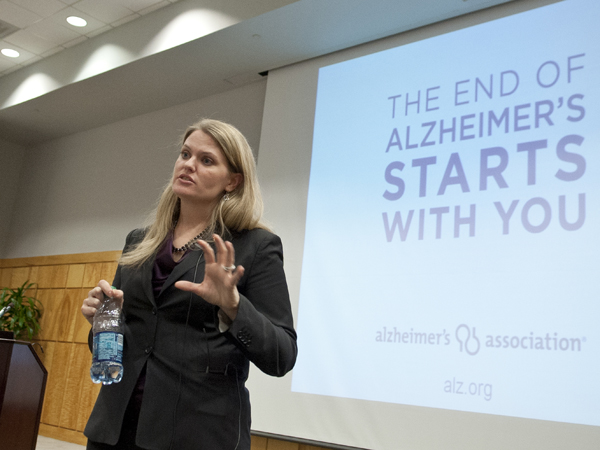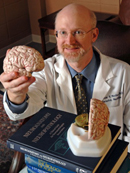More funding needed to ‘turn the tide’ of Alzheimer’s, leader says

Published in News Stories on November 17, 2014
A representative from the world’s leading volunteer organization devoted to the care, support and research of Alzheimer’s disease visited the University of Mississippi Medical Center on Thursday to share updates from the association with local researchers and politicians.
But Dr. Heather Snyder, the Alzheimer’s Association director of medical and scientific relations, didn’t just pick UMMC from a map. Over the course of her organization’s funding of research into disease, the state of Mississippi has received nearly $1 million with the majority going to UMMC.
“We’ve funded over $335 million in Alzheimer’s and dementia science all around the world,” said Snyder, speaking to staff of UMMC’s MIND Center and representatives from the Mississippi Alzheimer’s Association. Attendance also included representation from the offices of U.S. Sens. Thad Cochran and Roger Wicker and from the office of state Representative and Speaker of the House Philip Gunn.
Snyder said the overall funding of Alzheimer’s research from all entities still pales in comparison to funding committed to researching other diseases.
“In the United States we spend about $500 million to $600 million on Alzheimer’s,” said Snyder. “Other diseases likes HIV/AIDS, we spend about $3 billion. Cardiovascular disease, over $5 billion. Cancer research, over $6 billion. And we have made significant progress on these and have turned the tides.”
There are more than 5 million Americans living with Alzheimer’s today and some 15 million caretakers and family members that are helping those affected by the disease, she said. The economic toll associated with Alzheimer’s topped over $150 billion last year.
“It’s the sixth leading cause of death in the country,” said Snyder. “It’s the only cause of death in the top 10 that we currently don’t have a way to stop or slow.”
But Snyder told those assembled at the UMMC discussion that tides of Alzheimer’s disease – much like cardiovascular disease, cancer and HIV/AIDS – can be turned.

Mosley
“We work closely with the Alzheimer's Association locally, particularly in the areas of raising community awareness about Alzheimer's and related conditions and providing information and support to caregivers,” said Dr. Thomas Mosley, director of the MIND Center and professor of geriatric medicine.
“We were delighted to host leadership from the national office to provide an update on global efforts to address the Alzheimer's epidemic, and also to have the opportunity to update the AA on our ongoing studies.”
Mosley said he anticipates the relationship between the two organizations will become stronger as the Alzheimer's Association grows its efforts to share data from large studies such as those being conducted at the MIND Center to facilitate addressing complicated research questions that require very large samples of patients.
“We share a common goal to live in a world that is free of Alzheimer's disease,” Mosley added.


